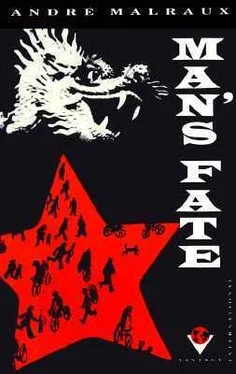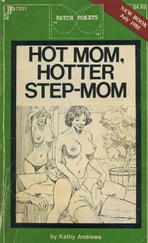Andre Malraux - Man's Fate
Здесь есть возможность читать онлайн «Andre Malraux - Man's Fate» весь текст электронной книги совершенно бесплатно (целиком полную версию без сокращений). В некоторых случаях можно слушать аудио, скачать через торрент в формате fb2 и присутствует краткое содержание. Год выпуска: 1990, Издательство: Vintage, Жанр: Современная проза, на английском языке. Описание произведения, (предисловие) а так же отзывы посетителей доступны на портале библиотеки ЛибКат.
- Название:Man's Fate
- Автор:
- Издательство:Vintage
- Жанр:
- Год:1990
- ISBN:нет данных
- Рейтинг книги:3 / 5. Голосов: 1
-
Избранное:Добавить в избранное
- Отзывы:
-
Ваша оценка:
- 60
- 1
- 2
- 3
- 4
- 5
Man's Fate: краткое содержание, описание и аннотация
Предлагаем к чтению аннотацию, описание, краткое содержание или предисловие (зависит от того, что написал сам автор книги «Man's Fate»). Если вы не нашли необходимую информацию о книге — напишите в комментариях, мы постараемся отыскать её.
As a study of conspiracy and conspirators, of men caught in the desperate clash of ideologies, betrayal, expediency, and free will, Andre Malraux's novel remains unequaled.
Man's Fate — читать онлайн бесплатно полную книгу (весь текст) целиком
Ниже представлен текст книги, разбитый по страницам. Система сохранения места последней прочитанной страницы, позволяет с удобством читать онлайн бесплатно книгу «Man's Fate», без необходимости каждый раз заново искать на чём Вы остановились. Поставьте закладку, и сможете в любой момент перейти на страницу, на которой закончили чтение.
Интервал:
Закладка:
“Aren’t you wondering why I haven’t yet sent this revolver flying into your face?”
“I think I am very close to death: that kills curiosity. And you have already said, ‘I’ve got something better. ’ ”
KOnig rang.
“Perhaps I’ll come tonight and ask you what you think of human dignity. ,To the prison-yard, series A,” he said to the guards were entering.
Four o’clock in the afternoon
Clappique mingled in the stir that was pushing the crowd of the concessions towards the barbed wires: in the Avenue of the Two Republics the executioner was passing, his short saber on his shoulder, followed by his escort of Mauserists. Clappique immediately turned about, and made for the concession. Kyo arrested, the Communist defense crushed, a great number of sympathizers murdered in the European city itself. KOnig had given him until evening: he would no longer be protected after that. Gun-shots here and there on every side. Carried by the wind, it seemed to him that they were coming nearer to him, and death with them. “I don’t want to die,” he said between his teeth, “I don’t want to die.” He became aware of the fact that he was running. He reached the docks.
No passport, and not enough money left to get a ticket.
Three steamships, one of them French. Clappique stopped running. Stow away in one of the life-boats under the tarpaulin? But he would have to get aboard, and the man at the gangway would not let him pass. Anyway, the idea was idiotic. The hatches? Idiotic, idiotic, idiotic. Go and find the captain and try to bluff him? He had gotten out of scrapes in this way before; but this time the captain would take him for a Communist, and would refuse to take him on board. The ship was leaving in two hours: a bad moment to disturb the captain. If he were discovered on board once the ship was out at sea, he could manage; but the trick was to get aboard.
He could just see himself hidden in some corner, crouched in a barrel; but this time his imagination did not save him. He seemed to be offering himself, as if to the mediators of an unknown god, to those enormous, bristling steamships, charged with destinies, indifferent to the point of hatred. He had stopped before the French ship. He was thinking nothing, looking, fascinated by the gangplank, at the men who were getting on and off (none of whom was thinking of him, nor guessed his torment and whom he would have liked to for this), who showed their tickets as they passed the bulwarks. Make a false ticket? Absurd.
A mosquito stung him. He brushed it away, touching his cheek as he did so: he needed a shave. As though any act of attention to one’s personal appearance were propitious to departures, he decided to go and get a shave, but without going far from the ship. Beyond the sheds, among the bars and curio-shops, he discovered a Chinese barbershop. The proprietor also ran a wretched cafe, and the two businesses were separated only by a hanging mat. While waiting for his turn, Clappique sat down near the mat and continued to watch the gangway of the ship. On the other side, people were talking:
“It’s the third one,” said a man’s voice.
“With the baby, nobody will take us. What if we tried one of the rich hotels?”
A woman answered:
“Dressed as we are? The fellow at the door would throw us out before we even reached it.”
“There they don’t mind if the children make a noise. Let’s try some more-anywhere.”
“As soon as the managers see the kid, they’ll refuse. Only the Chinese hotels would take us in, but the kid would get sick from their dirty food.”
“In a poor European hotel, if we could manage to get him in without their noticing it, perhaps they wouldn’t dare to throw us out, once we were there. In any case, we’d be gaining time. We’d have to wrap up the little fellow, so they would think it was linen.” “Linen doesn’t cry.”
“With the bottle in his mouth he won’t cry. ” “Perhaps. I could make arrangements at the desk, and
you could come in afterward. You could just pass by the clerk without stopping.”
Silence. Clappique was looking at the gangway. A rustle of paper.
“You can’t imagine how it hurts me to carry him like this. … I have the feeling that it’s a bad omen for his whole life. And I’m afraid it will hurt him.” Silence again. Had they left? The client was getting out of the barber’s chair. The barber made a sign to Clappique, who got into it, still keeping his eye on the ship. The gangplank was deserted, but scarcely was Clappique’s face covered with lather than a sailor went on board, carrying two new pails (which he had perhaps just bought) and brooms on his shoulder. Clappique’s eyes followed him, step by step-he would have identified himself with a dog, if the dog were climbing the gangplank and leaving with the ship. The sailor passed in front of the man at the bulwark without a word.
Clappique paid for the shave, throwing the coins on the washstand, tore off the towels and ran out, his face full of soap. He knew where he could find some secondhand dealers. People were looking at him: after taking ten steps, he went back, washed his face, started off again.
He had no trouble in finding a blue sailor-suit at the first dealer’s. He hurried back to his hotel, changed clothes. “I ought to have a few brooms, or something like that.” Buy some old brooms from the “boys”? Absurd: Why would a sailor be parading about on land with his prooms? To look more handsome? Completely idiotic. If he crossed the gangway with brooms, it would be because he had just bought them on land. They must be new. Let’s go and buy some.
He entered the shop with his usual Clappique-air. Before the disdainful look of the English salesman, he exclaimed: “Into my arms!” put the brooms on his shoulder, turned round, knocking down one of the brass lamps, and went out.
“Into my arms,” in spite of his deliberate extravagance, expressed what he felt: up to that point, he had been playing an uncomfortable comedy, through an obscure prompting of his conscience and through fear, but without freeing himself from the unavowed sense that he would fail; the salesman’s disdain-although Clappique, forgetting about his costume, had not assumed the manner of a sailor-proved to him that he could succeed. With the brooms on his shoulder, he was walking towards the steamer, watching all eyes as he went, to find in them the con^firmation of his new status. As when he had stopped before the gangplank, he was stupefied to discover how indifferent his fate was to others-it existed only for him. The travelers, awhile ago, had gone aboard without noticing the man left standing on the quay, perhaps to be killed; the passers-by were now looking indifferently at this sailor; no one came out of the crowd to express astonishment or to recognize him; not even a curious face. Not that there was anything about an assumed life to astonish him, but this time it was imposed upon him, and his real life perhaps depended on it. He was thirsty. He stopped at a Chinese bar, put down his brooms. As soon as he started to drink, he realized that he was not thirsty at all, that he had merely wanted to try himself out once more. The manner in which the man behind the counter gave him back his change was enough to enlighten him. Since he had changed his costume, the world around him had become transformed. He tried to discover how: it was the way people looked at him that had changed. The habitual single wimess of his mythomania had become a crowd.
At the same time-pleasure or a defensive instinct-the general acceptance of his new civil status pervaded him, too. He had found, suddenly, by accident, the most dazzling success of his life. No, men do not exist, since a costume is enough to enable one to escape from oneself, to find another life in the eyes of others. It was the same feeling of strangeness, of happiness that had seized him the first time he had found himself in a Chinese crowd-but now the sensation had not only surface, but depth. “Now I’m living a story, not merely telling one!” Carrying his brooms like guns, he crossed the gangplank, passed the man at the bulwark (he felt his knees almost giving way), and found himself on the deck. He hurried forward among the passengers of the bridge, put his brooms on a coil of rope. He was safe, at least until they struck the first port. However, he was far from feeling at ease. One of the deck passengers, a Russian, came up to him:
Читать дальшеИнтервал:
Закладка:
Похожие книги на «Man's Fate»
Представляем Вашему вниманию похожие книги на «Man's Fate» списком для выбора. Мы отобрали схожую по названию и смыслу литературу в надежде предоставить читателям больше вариантов отыскать новые, интересные, ещё непрочитанные произведения.
Обсуждение, отзывы о книге «Man's Fate» и просто собственные мнения читателей. Оставьте ваши комментарии, напишите, что Вы думаете о произведении, его смысле или главных героях. Укажите что конкретно понравилось, а что нет, и почему Вы так считаете.











